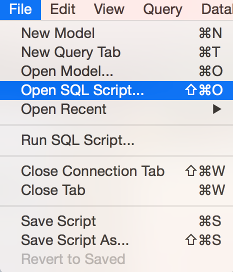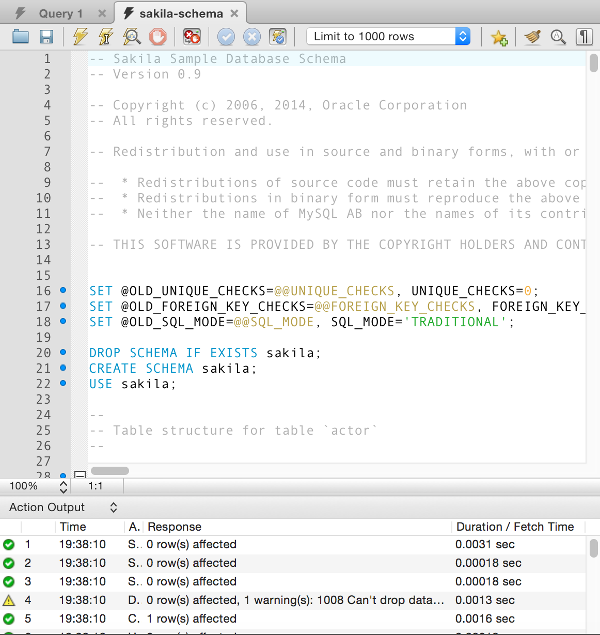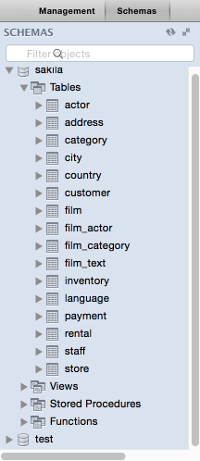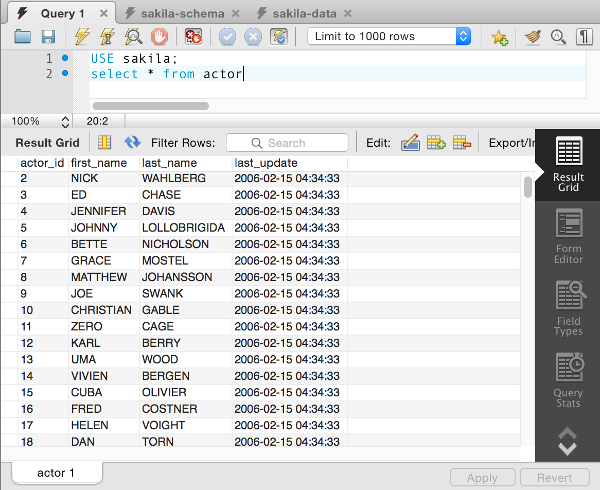Sakila sample database что это
Русские Блоги
Скриптовый анализ базы данных sakila на базе mysql
Этот пример представляет собой сложный анализ запросов, основанный на сценарии базы данных mysql sakila, вы можете перейти на официальный сайт mysql, чтобы загрузить этот сценарий; вы также можете ввестиСкачать со страницы моего ресурса:
Диаграмма отношений выглядит следующим образом:
Ниже приведен пример запроса:
1. Запросите категорию и язык фильма.
2. Узнайте, кто играет в том или ином фильме.
3. Запросите количество актеров в фильме.
4. Запросите идентификатор фильма и инвентарный номер.
5. Запрос: название фильма, инвентарный номер.
6. Запросите адрес, соответствующий магазину, и имя ответственного лица.
7. Запросите имя сотрудника и соответствующий ему адрес.
8. Запросите запись о потреблении клиента: имя клиента, объем потребления.
9. Запросить общий объем продаж сотрудника: имя сотрудника, общий объем продаж.
10. Запросите название фильма, предоставленного покупателем.
11. Запросите популярность фильма, отсортируйте его по популярности.
13. Спросите клиента с наибольшим потреблением и типа пленки, которую он любит брать.
14. Запросите категорию, язык и количество актеров, которым принадлежит фильм.
15. Запросите запись о потреблении определенного клиента; имя полученного сотрудника. Сумма потребления
16. Запросить общее потребление клиента.
Интеллектуальная рекомендация
Разработка Android NDK (1)
Использование C ++ для реализации свертки простого двумерного изображения
Использование C ++ для реализации свертки двумерного изображения оглавление Использование C ++ для реализации свертки двумерного изображения Введение 2. Требования к проекту 3. Простые знания, связанн.
Кто действительно хочет узнать U3D, приди, я возьму тебя
Игра FreeShale Game Triver OLED12864 Отображает изображение для трека, совместное использование кода
Сначала сначала собирайте изображения камеры, потому что оборудование отличается, я не буду объяснять это. Во-вторых, бинаризация собранного изображения В-третьих, вызовите следующую функцию, чтобы от.
MySQL Sample Database
This page demonstrates how to download and install a sample database — the Sakila sample database.
Why Install a Sample Database?
You can use a sample database to experiment with, without being concerned about accidentally deleting the wrong data or dropping the wrong tables, etc. If this happens, you can always re-install the DB (just run two scripts).
Also, one of the hardest things when developing your skills with databases is finding a database that contains enough data. So far we’ve used a very small database for our examples. That works fine for simple examples, but it can become quite limiting if you want to try out queries on a larger set of data.
The more complex your queries become, the more they will narrow the data down further. This is a crucial part of SQL programming. If your queries become complex, but you still only have a handful of records in the database, all your queries are going to return zero results!
Furthermore, if you only have two tables in your database, you can’t really stretch out with more advanced queries.
This is when you need a larger database.
About the Sakila Sample Database
The Sakila sample database was created for the purposes of tutorials, books, examples, etc. It’s also designed to take advantage of the various aspects of MySQL, including any new features.
Download the Sakila Database
First of all, download the Sakila database from the MySQL website.
This will give you two scripts to run (compressed into a Zip or TGZ file).
Install the Sakila Database
You install the database by running the two SQL scripts (one for the DB structure, one for the data).
Extract the Scripts
Extract the two SQL scripts from the ZIP or TGZ file (they should be called sakila-schema.sql and sakila-data.sql )
Open the Scripts
From MySQL Workbench, select File | Open SQL Script…
Navigate to the sakila-schema.sql script and select it, so that it opens in a query tab.
Execute the script
Click the Execute button to run the script.
Repeat for the other Script
Now do the same with the other script ( sakila-data.sql )
The Result
The SCHEMAS tab
The Sakila sample database should now be listed under the SCHEMAS tab.
Opening the database will reveal its tables and other objects.
Run a Query
Running a query against any of the tables should return some results.
Go ahead, use this database to experiment with. Select, delete, drop, create… it doesn’t matter — you can always restore the DB at any time using the method above. Just run the two scripts. Simple!
If you’re looking ideas on creating different queries, my SQL tutorial includes a few that we didn’t cover here. In particular, you should be able to have some fun with SQL Joins when selecting data, and you could always try altering a table. After all, you can restore the DB as often as you like. Have fun!
Инфо-бизнес
Импорт БД Sakila в MySQL на Ubuntu 18.04 через консоль
При изучении книги Алана Бьюли «Изучаем SQL» третьей редакции от 2020г., возникла необходимость установки своего сервера MySQL и импорта базы данных Sakila для работы с примерами из этой книги.
Автор предлагает нам два способа повторения написания примеров из книги. Первый — пользоваться уже настроенной на удаленном сервере O’Reilly СУБД MySQL с уже установленной БД Sakila. Вторым способом он предлагает самостоятельно настроить сервер системы управления базами данных и импортировать в нее БД Sakila.
Сразу скажу что первый способ не подходит для спокойного изучения примеров из книги. Сервер MySQL Katacoda предлагается использовать в режиме песочницы и очень ограниченно по времени. То есть, если вы будете работать с этой СУБД, вам придется уложиться в час-полтора за сеанс и быть готовым к тому, что все ваши наработки не сохранятся так как при следующем запуске сервера вам будет предложен совершенно новый сервер.
При работе с примерами таблиц person и favorite_food это было для меня особенно неудобно и решил использовать второй способ.
Я поднял на виртуальной машине Ubuntu 18.04.5 и установил MySQL. Этот процесс мы тут рассматривать не будем и перейдем непосредственно к импорту БД Sakila.
Сначала нам надо скачать БД Sakila:
Теперь нужно создать БД sakila чтоб не получить ошибку «ERROR 1049 (42000): Unknown database«:
mysql> CREATE DATABASE sakila
Выходим из mysql и приступаем к импорту (порядок ввода очень важен):
Вот и все, теперь заходим в СУБД, выбираем БД sakila:
И вызываем просмотр таблиц этой БД:
Очень надеюсь что помог вам, приятного изучения по-настоящему хорошей книги!
Sakila sample database что это
Copyright © 2007, 2021, Oracle and/or its affiliates.
This software and related documentation are provided under a license agreement containing restrictions on use and disclosure and are protected by intellectual property laws. Except as expressly permitted in your license agreement or allowed by law, you may not use, copy, reproduce, translate, broadcast, modify, license, transmit, distribute, exhibit, perform, publish, or display any part, in any form, or by any means. Reverse engineering, disassembly, or decompilation of this software, unless required by law for interoperability, is prohibited.
The information contained herein is subject to change without notice and is not warranted to be error-free. If you find any errors, please report them to us in writing.
If this is software or related documentation that is delivered to the U.S. Government or anyone licensing it on behalf of the U.S. Government, then the following notice is applicable:
U.S. GOVERNMENT END USERS: Oracle programs (including any operating system, integrated software, any programs embedded, installed or activated on delivered hardware, and modifications of such programs) and Oracle computer documentation or other Oracle data delivered to or accessed by U.S. Government end users are «commercial computer software» or «commercial computer software documentation» pursuant to the applicable Federal Acquisition Regulation and agency-specific supplemental regulations. As such, the use, reproduction, duplication, release, display, disclosure, modification, preparation of derivative works, and/or adaptation of i) Oracle programs (including any operating system, integrated software, any programs embedded, installed or activated on delivered hardware, and modifications of such programs), ii) Oracle computer documentation and/or iii) other Oracle data, is subject to the rights and limitations specified in the license contained in the applicable contract. The terms governing the U.S. Government’s use of Oracle cloud services are defined by the applicable contract for such services. No other rights are granted to the U.S. Government.
This software or hardware is developed for general use in a variety of information management applications. It is not developed or intended for use in any inherently dangerous applications, including applications that may create a risk of personal injury. If you use this software or hardware in dangerous applications, then you shall be responsible to take all appropriate fail-safe, backup, redundancy, and other measures to ensure its safe use. Oracle Corporation and its affiliates disclaim any liability for any damages caused by use of this software or hardware in dangerous applications.
Oracle and Java are registered trademarks of Oracle and/or its affiliates. Other names may be trademarks of their respective owners.
Intel and Intel Inside are trademarks or registered trademarks of Intel Corporation. All SPARC trademarks are used under license and are trademarks or registered trademarks of SPARC International, Inc. AMD, Epyc, and the AMD logo are trademarks or registered trademarks of Advanced Micro Devices. UNIX is a registered trademark of The Open Group.
This software or hardware and documentation may provide access to or information about content, products, and services from third parties. Oracle Corporation and its affiliates are not responsible for and expressly disclaim all warranties of any kind with respect to third-party content, products, and services unless otherwise set forth in an applicable agreement between you and Oracle. Oracle Corporation and its affiliates will not be responsible for any loss, costs, or damages incurred due to your access to or use of third-party content, products, or services, except as set forth in an applicable agreement between you and Oracle.
This documentation is NOT distributed under a GPL license. Use of this documentation is subject to the following terms:
You may create a printed copy of this documentation solely for your own personal use. Conversion to other formats is allowed as long as the actual content is not altered or edited in any way. You shall not publish or distribute this documentation in any form or on any media, except if you distribute the documentation in a manner similar to how Oracle disseminates it (that is, electronically for download on a Web site with the software) or on a CD-ROM or similar medium, provided however that the documentation is disseminated together with the software on the same medium. Any other use, such as any dissemination of printed copies or use of this documentation, in whole or in part, in another publication, requires the prior written consent from an authorized representative of Oracle. Oracle and/or its affiliates reserve any and all rights to this documentation not expressly granted above.
Sakila sample database что это
These are a few usage examples of how to perform common operations using the Sakila sample database. While these operations are good candidates for stored procedures and views, such implementation is intentionally left as an exercise to the user.
Rent a DVD
To rent a DVD, first confirm that the given inventory item is in stock, and then insert a row into the rental table. After the rental table is created, insert a row into the payment table. Depending on business rules, you may also need to check whether the customer has an outstanding balance before processing the rental.
Return a DVD
To return a DVD, update the rental table and set the return date. To do this, first identify the rental_id to update based on the inventory_id of the item being returned. Depending on the situation, it may be necessary to check the customer balance and perhaps process a payment for overdue fees by inserting a row into the payment table.
Find Overdue DVDs
Many DVD stores produce a daily list of overdue rentals so that customers can be contacted and asked to return their overdue DVDs.
To create such a list, search the rental table for films with a return date that is NULL and where the rental date is further in the past than the rental duration specified in the film table. If so, the film is overdue and we should produce the name of the film along with the customer name and phone number.









